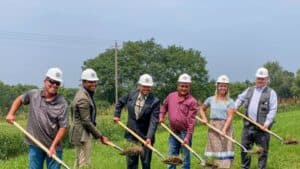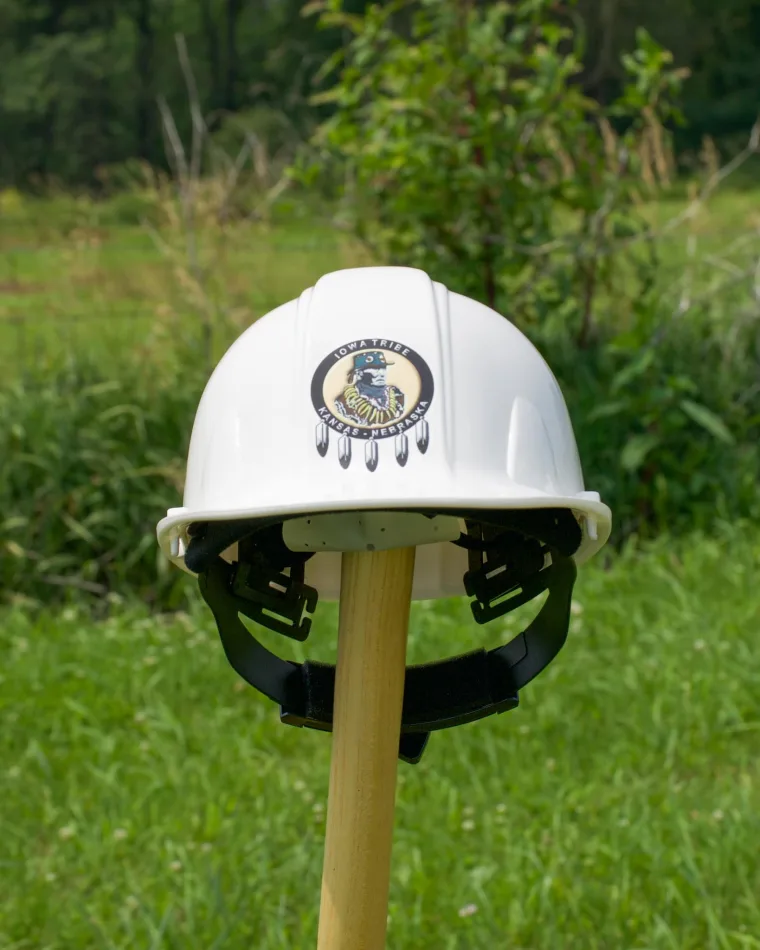The billboard project is expanding to Oregon
Tribe building trade zone to make money, jobs
The Iowa Tribe of Kansas and Nebraska is building a foreign trade zone to make money and create jobs for tribal citizens
Kevin Abourezk
ICT

Iowa Tribe of Kansas and Nebraska leaders and others break ground on July 17, 2023, at the site of a future free trade zone that the tribe is building near its northeastern Kansas reservation. From left to right: Brandon Roberts, tribal member and deputy general manager of Grey Snow Construction Services; Benson Saulo, Australian consul-general and trade and investment commissioner; tribal Chairman Timothy Rhodd; tribal Secretary Tony Fee; tribal member Cheyenne Colborn; and tribal Vice-Chairman Lance Foster. (Courtesy of Iowa Tribe)
A tribe that has land in Kansas and Nebraska is hoping to make money by taking advantage of federal rules related to the import and export of foreign and domestic goods.
The Iowa Tribe of Kansas and Nebraska plans to establish a foreign trade zone in Missouri northeast of its reservation straddling Kansas and Nebraska. The tribe chose the location because of its proximity to an interstate, as well as rail, water, and air transportation routes.
“Tribes have been utilizing our trade routes for hundreds of years,” said tribal Chairman Tim Rhodd. “Through this zone, we’re able to connect with other tribes and strengthen intertribal trade, even looking at Indigenous trade with global partners as well.”
A foreign trade zone is a designated area within the United States where foreign and domestic goods are treated as if they had never entered the country. Companies that import goods into a foreign trade zone aren’t required to pay tariffs, which is a type of tax, on those goods.
Once the goods imported into a trade zone are moved out of the zone and onto U.S. soil, those goods are then taxed. But if a company moves goods from a trade zone to another trade zone or to another country, it will never have to pay a tariff on those goods.
Companies can also use foreign trade zones to reduce the amount of tariffs that they will have to pay once they move goods onto U.S. soil. They can do this by transforming an imported raw material inside the trade zone into a product that is taxed at a lesser rate than the raw material once it leaves the zone.

For example, a company could import wood into a foreign trade zone and then use it to manufacture a chair. If the tariff on the wood is $10 when it enters U.S. soil but the tariff on the chair is only $5 when it enters U.S. soil, a company could save $5 per chair by utilizing a foreign trade zone.
Beyond using a foreign trade zone to reduce the amount tariffs it will pay on goods that it imports, a company can rent space in its trade zone to other companies. Rhodd said he’s hopeful the trade zone will allow the tribe to create high-paying jobs for tribal citizens and residents from nearby communities.
“In the tribe’s standpoint, it’s a tool that we can utilize to attract these businesses that would want to use these zones,” he said. “It’s also a tool if we take it to the next level with light manufacturing, light assembly. That’s some workforce development opportunities for our tribal members and also the surrounding community.”
The Iowa Tribe won’t be the first tribe to establish a free trade zone, though it’s rare for tribes to do so, according to the Bureau of Indian Affairs. At least five other tribes have applied to the federal government to establish trade zones, though few of them appear to have actually ever utilized those trade zones.
The Iowa Tribe broke ground on its seven-acre foreign trade zone on July 17 and hopes to complete Phase I of the trade zone within six months. The trade zone will be located about 30 minutes from the tribe’s reservation on its traditional lands that the federal government took from it as part of the 1837 Platte Purchase.
The Iowa Tribe’s trade zone will be affiliated with the nearby Greater Kansas City Foreign Trade Zone, and the tribe expects the larger trade zone to send it products that it doesn’t have space to handle.
“We expect it to be a fairly successful foreign trade zone location,” said Olivia Brien, Iowa Tribe communications director.
The tribe’s economic development corporation, Grey Snow Management Solutions, will manage the foreign trade zone.
David Tam, CEO of Grey Snow, said the tribe plans to develop trade relationships with Indigenous people from foreign nations such as Australia, New Zealand and Saipan in order to import goods from those Indigenous peoples.
“We’re already working on our international relationships,” Tam said.
External
Identification not yet made
UTTC International Powwow attendees share their rules for a fun and considerate event
Radio collaboration highlights importance of cooperation in a season of funding cuts for local media
A memorial in the Snow County Prison, now the United Tribes Technical College campus
Standing Rock Sioux Tribal Chairwoman Janet Alkire tells crowd, ‘We’re going to rely on each other’






